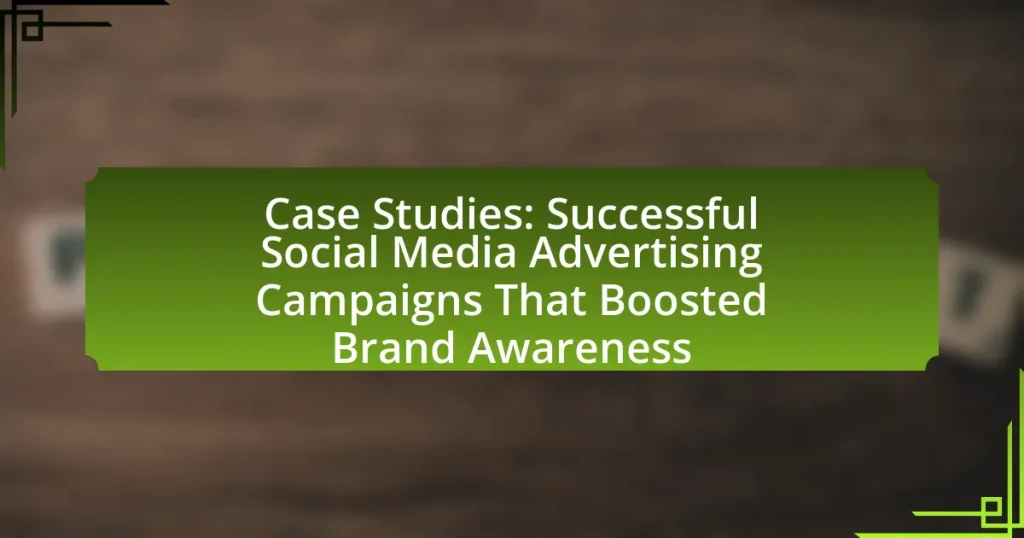Building long-term relationships with brand sponsors on social media involves creating ongoing partnerships characterized by trust, collaboration, and consistent engagement. These relationships are crucial as they enhance brand credibility, increase customer retention, and foster authentic content creation. Key elements for successful sponsorships include alignment of values, clear communication, and mutual benefits, while effective strategies such as consistent communication and collaborative content creation can strengthen these partnerships. Additionally, understanding audience engagement and utilizing analytics tools are essential for measuring success and addressing challenges in maintaining these relationships.

What does it mean to build long-term relationships with brand sponsors on social media?
Building long-term relationships with brand sponsors on social media means establishing ongoing partnerships that foster mutual trust, collaboration, and consistent engagement over time. These relationships enable brands to leverage the influencer’s audience while providing influencers with reliable support and resources, leading to authentic content creation. Research indicates that 70% of marketers believe that long-term partnerships yield better results than one-off collaborations, as they allow for deeper brand storytelling and audience connection.
Why are long-term relationships important in brand sponsorships?
Long-term relationships are important in brand sponsorships because they foster trust and loyalty between brands and their partners. This trust leads to more authentic collaborations, which can enhance brand credibility and consumer perception. Research indicates that brands with established partnerships experience a 20% increase in customer retention rates, demonstrating the tangible benefits of sustained relationships. Additionally, long-term sponsorships allow for deeper engagement strategies, enabling brands to create more meaningful content that resonates with audiences over time.
What advantages do long-term relationships provide for brands?
Long-term relationships provide brands with increased customer loyalty, which leads to higher retention rates and repeat purchases. Research indicates that acquiring a new customer can cost five times more than retaining an existing one, highlighting the financial benefits of loyalty. Additionally, loyal customers are more likely to advocate for the brand, resulting in organic word-of-mouth marketing that can significantly enhance brand visibility and credibility. According to a study by Bain & Company, a 5% increase in customer retention can lead to a 25% to 95% increase in profits, demonstrating the substantial economic advantage of fostering long-term relationships.
How do long-term relationships benefit social media influencers?
Long-term relationships benefit social media influencers by providing consistent income and brand loyalty. These relationships allow influencers to establish trust with their audience, leading to higher engagement rates and more effective marketing campaigns. For instance, a study by the Influencer Marketing Hub found that 65% of marketers believe long-term partnerships yield better results than one-off collaborations. This consistency not only enhances the influencer’s credibility but also fosters a deeper connection with their followers, ultimately driving sales and brand awareness for the sponsors involved.
What are the key elements of successful brand sponsorship relationships?
Successful brand sponsorship relationships hinge on alignment of values, clear communication, mutual benefits, and measurable outcomes. Alignment of values ensures that both the brand and the sponsor share similar goals and target audiences, which fosters authenticity and trust. Clear communication facilitates understanding of expectations, roles, and responsibilities, reducing the likelihood of misunderstandings. Mutual benefits create a win-win scenario where both parties gain value, whether through increased visibility, sales, or brand loyalty. Finally, measurable outcomes allow for the assessment of the partnership’s effectiveness, enabling adjustments and improvements over time. These elements are supported by research indicating that partnerships with shared values and clear objectives yield higher engagement and satisfaction rates among consumers.
How does communication play a role in these relationships?
Communication is essential in building long-term relationships with brand sponsors on social media as it fosters trust and alignment of goals. Effective communication allows brands and sponsors to share their expectations, feedback, and performance metrics, which are crucial for collaboration. Research indicates that transparent communication can lead to a 25% increase in partnership satisfaction, as both parties feel heard and valued. Furthermore, regular updates and open dialogue help in addressing issues promptly, ensuring that both the brand and the sponsor remain aligned in their marketing strategies and objectives.
What trust-building strategies can be employed?
Trust-building strategies that can be employed include transparency, consistent communication, and delivering on promises. Transparency involves openly sharing information about brand values, practices, and any potential conflicts of interest, which fosters credibility. Consistent communication ensures that brand sponsors remain engaged with their audience, addressing concerns and feedback promptly, thereby reinforcing trust. Delivering on promises, such as meeting deadlines and maintaining quality, solidifies reliability in the relationship. Research indicates that brands demonstrating these strategies experience higher levels of consumer trust and loyalty, as evidenced by a study published in the Journal of Marketing Research, which found that transparency significantly enhances brand trust among consumers.

How can social media platforms facilitate brand sponsorship relationships?
Social media platforms facilitate brand sponsorship relationships by providing targeted advertising tools and analytics that connect brands with relevant audiences. These platforms enable brands to identify and engage with potential sponsors through audience insights, allowing for tailored content that resonates with specific demographics. For instance, platforms like Instagram and Facebook offer detailed analytics on user engagement, which brands can leverage to demonstrate the effectiveness of their sponsorships. Additionally, social media facilitates direct communication between brands and influencers, fostering collaboration and negotiation that can lead to long-term partnerships. According to a 2021 report by Influencer Marketing Hub, 63% of marketers plan to increase their influencer marketing budgets, highlighting the growing importance of these relationships in brand strategy.
What features of social media enhance brand partnerships?
Social media features that enhance brand partnerships include targeted advertising, engagement analytics, and influencer collaboration tools. Targeted advertising allows brands to reach specific demographics, increasing the likelihood of successful partnerships by aligning with audiences that share common interests. Engagement analytics provide insights into audience behavior and preferences, enabling brands to tailor their strategies for better collaboration outcomes. Influencer collaboration tools facilitate partnerships with social media influencers, leveraging their reach and credibility to enhance brand visibility and trust. These features collectively foster effective communication and alignment between brands, leading to stronger, long-term partnerships.
How do analytics tools contribute to relationship management?
Analytics tools enhance relationship management by providing data-driven insights that inform strategies for engagement and communication. These tools analyze customer behavior, preferences, and interactions, allowing brands to tailor their messaging and offerings to meet the specific needs of their audience. For instance, a study by McKinsey found that companies using advanced analytics can improve customer satisfaction by up to 20% and increase sales by 15%. This demonstrates that leveraging analytics tools not only fosters stronger connections with customers but also drives business growth through informed decision-making.
What role does audience engagement play in sponsorship success?
Audience engagement is crucial for sponsorship success as it directly influences brand visibility and consumer loyalty. Engaged audiences are more likely to interact with sponsored content, leading to higher conversion rates and brand recall. For instance, a study by Nielsen found that 92% of consumers trust recommendations from individuals over brands, highlighting the importance of authentic engagement in sponsorships. Furthermore, brands that foster strong audience connections through interactive campaigns see a 20% increase in sponsorship effectiveness, demonstrating that active participation enhances the overall impact of sponsorship initiatives.
What challenges might arise in maintaining these relationships?
Challenges in maintaining relationships with brand sponsors on social media include misalignment of values, communication breakdowns, and fluctuating audience engagement. Misalignment of values can occur when the brand’s messaging or actions do not resonate with the influencer’s audience, leading to a disconnect. Communication breakdowns may arise from unclear expectations or lack of regular updates, which can result in misunderstandings and dissatisfaction. Additionally, fluctuating audience engagement can impact the effectiveness of sponsored content, as changes in follower interest or platform algorithms can diminish visibility and interaction rates. These challenges highlight the need for ongoing alignment, clear communication, and adaptability in strategies to sustain successful partnerships.
How can conflicts be resolved effectively?
Conflicts can be resolved effectively through open communication, active listening, and collaborative problem-solving. Open communication allows all parties to express their perspectives and concerns, fostering an environment of trust. Active listening ensures that each party feels heard and understood, which can de-escalate tensions. Collaborative problem-solving involves working together to find mutually beneficial solutions, often leading to stronger relationships. Research indicates that organizations that prioritize these conflict resolution strategies experience improved partnerships and increased satisfaction among stakeholders, as evidenced by a study published in the Journal of Conflict Resolution, which found that effective communication and collaboration significantly reduce conflict recurrence.
What are common pitfalls to avoid in brand sponsorships?
Common pitfalls to avoid in brand sponsorships include misalignment of brand values, lack of clear communication, and insufficient audience research. Misalignment occurs when the sponsored content does not resonate with the brand’s core values or target audience, leading to a disconnect that can harm brand reputation. Lack of clear communication between the brand and the sponsor can result in unmet expectations and ineffective campaigns. Insufficient audience research can lead to targeting the wrong demographic, diminishing the impact of the sponsorship. According to a study by Nielsen, 63% of consumers prefer brands that align with their personal values, highlighting the importance of value alignment in successful sponsorships.

What strategies can be implemented to strengthen brand sponsor relationships on social media?
To strengthen brand sponsor relationships on social media, brands should prioritize consistent communication, collaborative content creation, and performance analytics. Consistent communication fosters trust and transparency, allowing both parties to align their goals and expectations. Collaborative content creation, such as co-branded campaigns, enhances engagement and showcases the partnership authentically, which can lead to increased visibility and audience reach. Performance analytics provide measurable insights into the effectiveness of the partnership, enabling brands to adjust strategies based on data-driven results. For instance, a study by Influencer Marketing Hub found that 63% of marketers believe that effective communication is key to successful influencer partnerships, highlighting the importance of these strategies in building long-term relationships.
How can content creation be aligned with brand values?
Content creation can be aligned with brand values by ensuring that all produced material reflects the core principles and mission of the brand. This alignment can be achieved through consistent messaging, visual identity, and storytelling that resonate with the brand’s ethos. For instance, a brand that prioritizes sustainability should create content that highlights eco-friendly practices, such as using recycled materials or promoting sustainable products. Research indicates that 64% of consumers make purchases based on shared values, demonstrating that aligning content with brand values not only enhances authenticity but also fosters deeper connections with the audience.
What types of content resonate best with audiences and sponsors?
Engaging and authentic content types resonate best with audiences and sponsors. This includes user-generated content, behind-the-scenes insights, and storytelling that aligns with brand values. For instance, a study by the Content Marketing Institute found that 70% of consumers prefer to learn about a company through articles rather than ads, indicating that informative and relatable content fosters deeper connections. Additionally, brands that utilize influencer partnerships often see higher engagement rates, as 49% of consumers depend on influencer recommendations for their purchasing decisions, demonstrating the effectiveness of authentic endorsements in building trust and long-term relationships.
How can storytelling enhance brand relationships?
Storytelling enhances brand relationships by creating emotional connections between the brand and its audience. When brands share compelling narratives, they engage consumers on a deeper level, fostering loyalty and trust. Research indicates that 92% of consumers prefer ads that feel like a story, highlighting the effectiveness of storytelling in capturing attention and resonating with audiences. This emotional engagement leads to increased brand recall and a stronger sense of community among consumers, ultimately driving long-term relationships.
What best practices should be followed for ongoing engagement?
To ensure ongoing engagement with brand sponsors on social media, brands should prioritize consistent communication, authentic content creation, and data-driven strategies. Consistent communication fosters trust and keeps sponsors informed about campaign progress and audience feedback. Authentic content creation resonates with audiences, enhancing brand loyalty and sponsor satisfaction. Data-driven strategies, such as analyzing engagement metrics and audience insights, allow brands to refine their approach and demonstrate value to sponsors. Research indicates that brands employing these practices see a 30% increase in sponsor retention rates, highlighting the effectiveness of these best practices in building long-term relationships.
How often should brands and influencers communicate?
Brands and influencers should communicate at least once a week to maintain a strong relationship. Regular communication fosters collaboration, ensures alignment on campaign goals, and allows for timely feedback. According to a study by the Influencer Marketing Hub, consistent engagement can lead to a 65% increase in campaign effectiveness, highlighting the importance of frequent interactions in building long-term partnerships.
What metrics should be tracked to measure relationship success?
To measure relationship success with brand sponsors on social media, key metrics include engagement rate, conversion rate, brand sentiment, and retention rate. Engagement rate quantifies interactions such as likes, shares, and comments relative to total followers, indicating how well the audience connects with the content. Conversion rate tracks the percentage of users who take a desired action, such as making a purchase or signing up for a newsletter, reflecting the effectiveness of the partnership. Brand sentiment analyzes audience perceptions through sentiment analysis tools, providing insights into how the brand is viewed positively or negatively. Retention rate measures the percentage of sponsors that continue partnerships over time, indicating the strength and satisfaction of the relationship. These metrics collectively provide a comprehensive view of relationship success in the context of social media brand sponsorships.
What practical tips can help in building long-term relationships with brand sponsors?
To build long-term relationships with brand sponsors, consistent communication is essential. Regularly updating sponsors on campaign progress and performance fosters transparency and trust. Additionally, aligning brand values and goals ensures mutual benefit, as evidenced by studies showing that brands with shared values experience higher engagement rates. Engaging in collaborative projects can also strengthen ties, as joint initiatives often lead to increased visibility and shared success. Finally, expressing appreciation through personalized gestures or feedback reinforces the partnership, contributing to longevity in the relationship.



